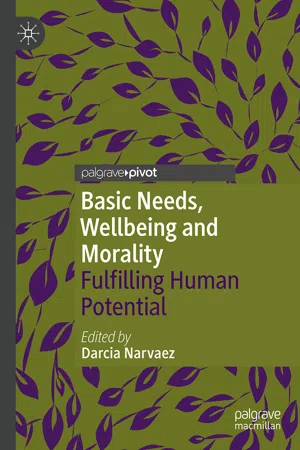In this chapter, we lay out Abraham Maslow’s hierarchy of basic needs (later expanded upon in Chapters 3 and 5). I follow this by providing empirical findings that show the importance of basic needs fulfillment in adulthood.
Maslow’s Hierarchy of Basic Needs
All organisms have needs. Typically, animals whose basic physiological needs (e.g., food, water) are not met for any length of time do not survive. In mid-twentieth century, among researchers, the idea of basic needs expanded to more areas in life beyond the physical. Mammals whose physiological needs are met but not higher order needs (love, affection) also suffer, as Harry Harlow (1958) demonstrated in experiments with mother-deprived monkeys.
The notion of basic needs entered broadly into psychological research discourse with humanistic psychologist, Abraham Maslow. He challenged the paradigms of both dominant theories of the time, psychoanalysis, and behaviorism. In his text,
Motivation and Personality (1970), discontented with psychoanalysis’ emphasis on psychopathology, he promoted health and wellbeing:
The motivational life of neurotic sufferers should, even in principle, be rejected as a paradigm for healthy motivation. Health is not simply the absence of disease or even the opposite of it. Any theory of motivation that is worthy of attention must deal with the highest capacities of the healthy and strong man as well as with the defensive maneuvers of crippled spirits. (Maslow, 1970, p. 33)
He also sought to shift the discussion of human motivation from the behaviorist focus on drives to needs—from “pushes” (drives) to “pulls” (needs). The study of rats, which were (and are) the typical animal tested in psychological experiments, oriented researchers to physiological needs since rats are highly oriented to eating, what researchers called an instinctual drive. But, according to Maslow, the more sophisticated goals of humans do not fit the notion of drives (e.g., desire for love, or for self-actualization). Nor is a healthy person neurotic as Freud (1933) postulated was the normal human condition.
In contrast to psychoanalysis, Maslow argued for a normative biology, saying that “The healthy organism itself gives clear and loud signals about what it, the organism, prefers or chooses, or considers to be desirable states of affairs. It is too big a jump to call these “values”? Biologically intrinsic values? Instinct-like values?” (Maslow, 1971, p. 12). Maslow pointed out that facts and values, which some scholars are concerned to keep separate, are fused in terms like “mature, evolved, developed, stunted, crippled, fully functioning, graceful, awkward, clumsy” (ibid., p. 30). As others have pointed out (e.g., Lapsley, 2006), the notion of development itself necessarily involves normative claims. What is the expected and best aim for development?
Maslow could not find scientific research that revealed the characteristics of healthy adults, so he turned to literature, autobiography and the study of acquaintances. He discovered layers of needs that he presented in a hierarchical manner. Maslow warned against setting up a specific list of drives or needs for several reasons: (1) they imply an equality of needs whereas in reality, the potency of one need will vary in importance and in relation to others; (2) drives are not isolated from one another—they are not mutually exclusive; and (3) an expressed, measurable desire may be a means to satisfy other drives. As a result, for the prior reasons an individual’s motivated behavior and specific goals are not a good way to classify drives. Instead, Maslow states: “If only by the process of logical exclusion alone we are finally left with the largely unconscious fundamental goals or needs as the only sound foundations for classification in motivation theory” (Maslow, 1970, p. 27).
Maslow divided basic needs or values into several categories: physiological, safety, belonging and love, esteem, and self-actualization. 1 His categories were loose and fuzzy, with many definitions vague or preliminary. He noted that there was little information on some of these needs in scientific circles, requiring a review of literature and autobiography for source material.
Physiological Needs
He discussed homeostasis and how it involves so many systems that there is no purpose in trying to make a list of physiological needs. And he said that in normal society you are not really going to see physiological needs unmet.
Safety Needs
Safety needs include: “security; stability; dependency; protection; freedom from fear, from anxiety and chaos; need for structure, order, law, limits; strength in the protector; and so on” (Maslow, 1970, p. 39).
Belongingness and Love Needs
Maslow argues that once physiological and safety needs are met, needs for affectionate relationships will be felt keenly and be a primary goal. Stating that there is little scientific evidence, he relied on fiction, autobiographies, and sociological literature to note the destructive effects of uprootedness on all ages, but especially the young. “Practically all theorists of psychopathology have stressed thwarting of the love needs as basic in the picture of maladjustment” (Maslow, 1970, p. 44). Love needs are relational, the giving and receiving of affection.
Esteem Needs
Esteem needs refer to self-respect and self-esteem and the esteem of others. The first aspect is a desire for competence, for mastery. The other aspect is a de...




